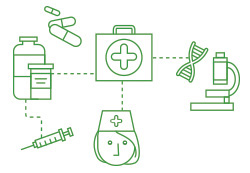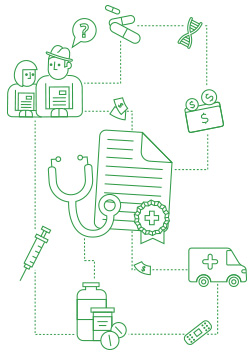It’s been a challenging 12 months for people in the medical field. Amid a health crisis, they have stood strong on the frontline and bravely put themselves in situations that most people would go to great lengths to avoid.
 While there has been a lot of praise and support for hospital workers, medical and allied health practice owners have also been doing it tough. From empty waiting rooms to rapid telehealth transitions, COVID-19 stress hasn’t escaped anyone in the sector.
While there has been a lot of praise and support for hospital workers, medical and allied health practice owners have also been doing it tough. From empty waiting rooms to rapid telehealth transitions, COVID-19 stress hasn’t escaped anyone in the sector.
It is no longer a choice, but a must for practice owners to monitor cash flow to maintain the sustainability of their medical practice.
Quite often, the owners and business managers of GP clinics and specialist practices are the medical professionals themselves. These are people who stepped into medicine to help their community and be experts at what they do. Practicing medicine and running a business are not the same, however, they are too committed to patient care to focus on the business side of running a practice.
When you add the stress of running a practice into their already long hours and the intensive requirements of practicing medicine – and then throw in a health crisis –attention should be paid to the anxiety these individuals are likely to be facing.
As a first step, we recommend making time to step back and take stock of the situation. Practice owners should do this regularly, whether they are struggling financially or doing well but feel overwhelmed by the amount of hours they work.
 There is often not much discussion around money in the medical field. No one feels comfortable talking about it however it is an unspoken expectation of the general public that because someone is a doctor or medical specialist they earn a fortune. Not only is this not always the case, but we’ve seen many doctors filing for bankruptcy due to severe cash flow problems.
There is often not much discussion around money in the medical field. No one feels comfortable talking about it however it is an unspoken expectation of the general public that because someone is a doctor or medical specialist they earn a fortune. Not only is this not always the case, but we’ve seen many doctors filing for bankruptcy due to severe cash flow problems.
Making time to evaluate your personal and practice cash flow, or engaging with a professional to evaluate it, is essential. It is the first step to understanding what’s going wrong and where big improvements can be made.
It is even more important for solo practitioners or specialists, because cash flow stops when they don’t see patients. There is no one else but themselves to fund their sick leave and annual leave, along with supporting their family.
 Medical professionals should consistently give themselves permission to attend to their own life as much as they do their patients, family, and community. In the Medical profession, it is common to frequently work themselves into the ground to try and see as many patients as possible. They are carrying the responsibility of someone’s life in their hands which is a highly stressful and intensive work environment. However, this doesn’t always compute into a positive bank balance.
Medical professionals should consistently give themselves permission to attend to their own life as much as they do their patients, family, and community. In the Medical profession, it is common to frequently work themselves into the ground to try and see as many patients as possible. They are carrying the responsibility of someone’s life in their hands which is a highly stressful and intensive work environment. However, this doesn’t always compute into a positive bank balance.
A medical professional has a different career lifecycle than most people because they spend so many years studying. If they wish to retire at the average age, they really need to have a wealth plan that accounts for the years of lost income due to study and the high HECS debt that comes with it.
With the right strategies and plan, they can absolutely provide high-quality medicine for a longer period while enjoying the financial rewards of their work. When your life is well balanced, the quality of your work improves. This applies to medical professionals as well.
RSM has a specialist division for medical and health professionals, offering personal and business support services that range from Medicare compliance and billing review, to improving business operations, practice security and fraud prevention, planning for retirement, asset protection, investment strategies and more.
HOW CAN RSM HELP?
If you have any questions regarding COVID-19 stress, get in touch with your local RSM expert.




